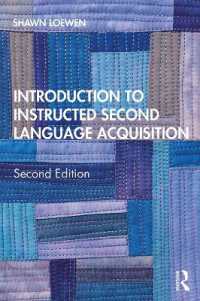- ホーム
- > 洋書
- > 英文書
- > Performing Arts
Full Description
Covering a broad historical spectrum from Greek Antiquity to the 21st century, this open access book asks how tragedy's formal features have impacted its travels, and how these travels have shaped its forms.
Bringing together an international and interdisciplinary group of scholars of classics, English, German and French literature, postcolonial literature, musicology and theatre and performance studies, it provides a multifaceted overview of form processes related to travelling. It presents tragedy as a dynamic figuration that emerges, stabilizes and transforms through relocation and adaptation.
The collection begins with the tragedies of Antiquity and then investigates the 17th and 18th centuries, from Shakespeare to Voltaire, as a laboratory for the formal transformation of tragedy, inextricably linked to the social and political changes of that time. The volume concludes with travelling tragedies in the 20th and 21st centuries. This section focuses on two former colonies on the African continent (Nigeria and South Africa) as an exemplary field for exploring form travel in the postcolonial, globalized present, in which tragic forms have become transcultural and are circulating so fast that they can no longer be easily related to concepts of locality, nation or continent.
Arguing that the strategies that made tragedy portable also expanded its formal potential, this book also discusses the migration of tragedy as a process of form itself. While adaptation studies frequently focuses on the political dimensions of transcultural modifications of tragic plots, this book suggests that formal concerns are also political and social matters.
The ebook editions of this book are available open access under a CC BY-NC-ND 4.0 licence on bloomsburycollections.com. Open access was funded by the University of Konstanz.
Contents
List of Illustrations
Note on Contributors
Tragedy as a Travelling Form: Introduction, Philipp Lammers, Juliane Vogel and Christina Wald (University of Konstanz, Germany)
I. Antiquity: The Dissemination of Greek Tragedy
1. Greek Tragedy on the Move: Travelling Tragedy and Travelling Tragedians, Edmund Stewart (University of Nottingham, UK)
2. Booking a Family Trip: Greek Tragedy, Pacuvius and Roman Sequels, Antje Wessels (Leiden University, the Netherlands)
3. Staging God: Transforming the Bible through Tragedy, Simon Goldhill (University of Cambridge, UK)
II. 17th and 18th Centuries: European Travels
4. Mercurial Acting: Travelling Tragedy and Travelling Troupes in 17th- and 18th-Century Germany, Juliane Vogel (University of Konstanz, Germany)
5. Casting Tragedy: Actors, Gender and Transnational Tragic Roles, Tanya Pollard (Brooklyn College, The City University of New York, USA)
6. Travelling with Orpheus in Early Modern European Opera, Dörte Schmidt (Berlin University of the Arts, Germany)
7. Julius Caesar, Altered. The Travels of Tragedy under Neoclassical Conditions (Voltaire, Conti), Philipp Lammers (University of Konstanz, Germany)
8. Tragedy Goes Global: Voltaire, Ethnological Ethopoeia and the History of Civilization, Rahul Markovits (École normale supérieure - PSL, France)
III. The Postcolonial 20th and 21st Centuries: Globalized Tragedy
9. Black Hamlet and the Resistance to Travel, Tobias Döring (Ludwig Maximilian University of Munich, Germany)
10. Perpendicular Theatres and Mammy Wagons: The Infrastructure of Tragedy in Post-Independence Nigeria, Christopher Balme (Ludwig Maximilian University of Munich, Germany)
11. Hamlet's Travels to Postcolonial Stages: Femi Osofisan's Wesóo, Hamlet! or, the Resurrection of Hamlet and the Royal Shakespeare Company's 2016 Hamlet, Christina Wald (University of Konstanz, Germany)
12. Tragedy, Apartheid, (de)Coloniality, Mark Fleishman (University of Cape Town, South Africa)
Index






